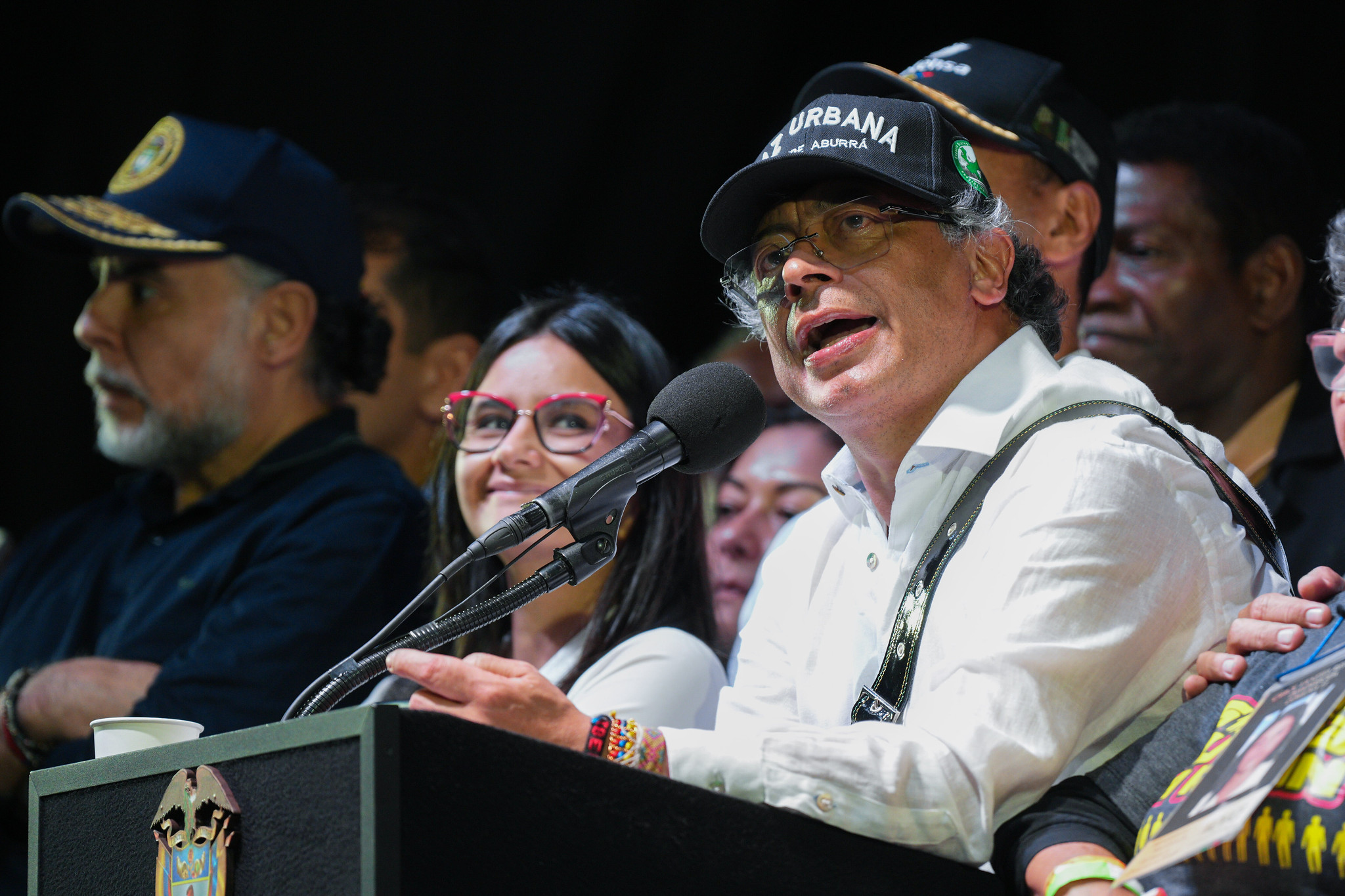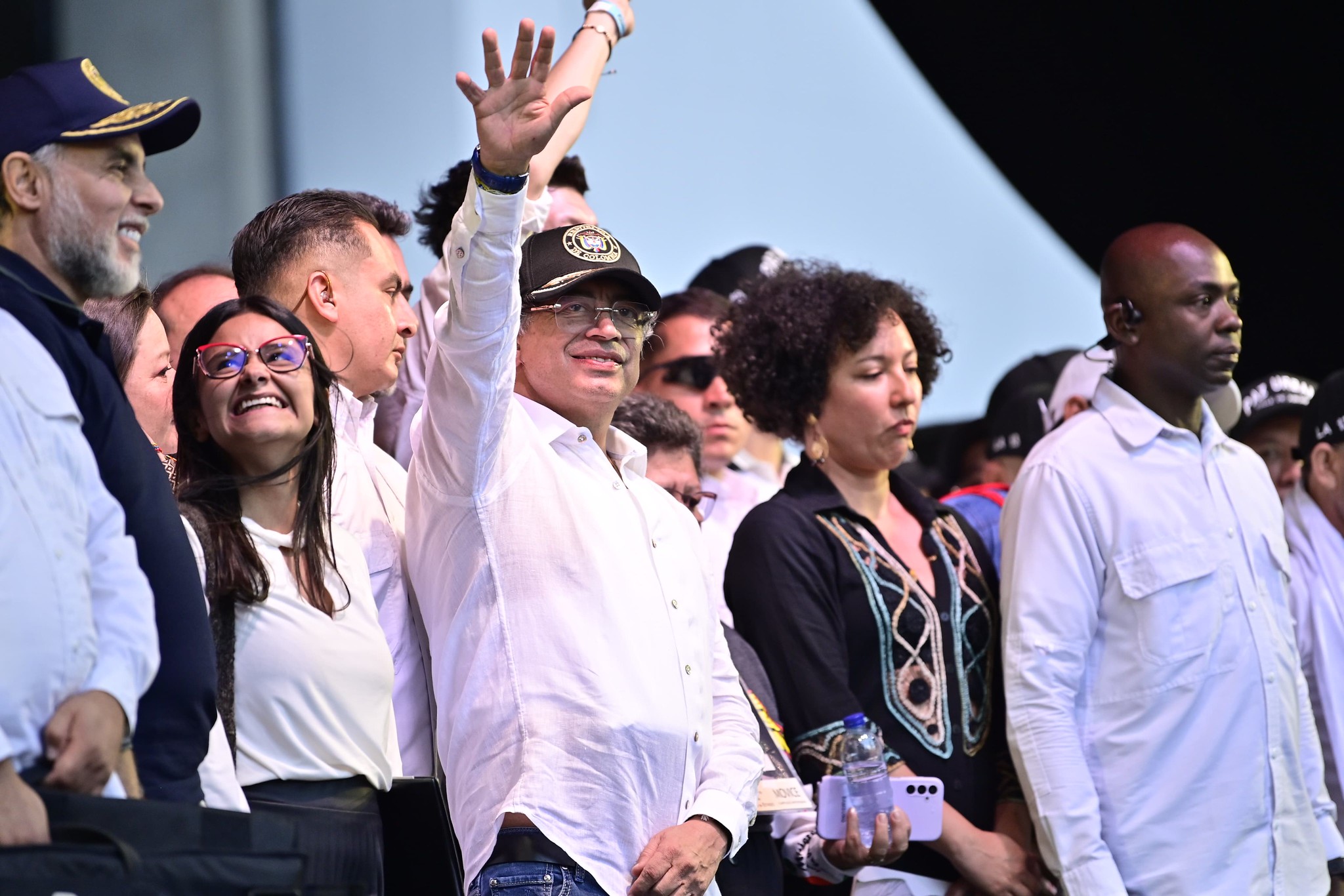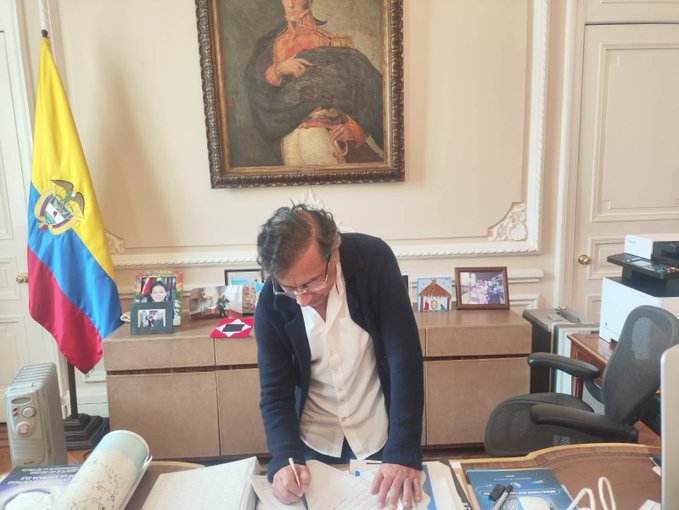Former President César Gaviria rejects Gustavo Petro's "urban peace" event and announcement of a constituent assembly.

Former Colombian President César Gaviria rejected the event held by President Gustavo Petro last Saturday, which featured several Medellín drug lords currently incarcerated in the Itagüí prison.
“ We Colombians observe with profound indignation President Petro's decision to summon a group of criminals to his side, taking them out of prison to accompany him from his platform at a political rally in La Alpujarra. This disregard for the suffering of the victims coincides with another open challenge to the constitutional and legal order,” the former president's statement reads.

President Gustavo Petro in his speech from Medellín. Photo: Presidency
He also recalled President Petro's announcement last Friday to convene a National Constituent Assembly, following the approval of the labor reform and the announcement of the repeal of the decree calling for the referendum.
" This initiative, far from being a democratic exercise, represents a strategy of confrontation, polarization, and manipulation to pave the way for a personalistic project that oversteps the boundaries of the Social Rule of Law," said Gaviria, who added that this is no coincidence.
"We assume that the 'Petro Constitution' will be created as a way to implement the 'Pact of La Picota,' shamefully demonstrated on the La Alpujarra stage this weekend in Medellín. Seeking the support of criminal organizations further aggravates Petro's attempt to disrupt the constitutional order," he said.

President Gustavo Petro in his speech from Medellín. Photo: Presidency
He added: “These proposals confirm that Petro has an authoritarian conception of power. He believes he can do whatever he wants, however he wants. He sees himself as the Supreme Court, without limits to respect , above the Cortes and Congress, with no respect for the opinions of others or the rights of the opposition.”
The former president insisted that the head of state has an authoritarian conception of power. “ President Petro intends to reduce the role of the people to casting the ballot he tells them to. It is an insult to all Colombians that the president treats them like sheep who must go to the polls to cast the ballot the executive branch imposes on them. We must be clear: the 1991 Constitution cannot be changed on a whim or by ballot. Any attempt to do so outside of the established channels represents a breach of the constitutional order,” he emphasized.
He added: “We cannot fool ourselves: the true purpose of this proposal is to replace the electoral strategy of the failed referendum. President Petro seeks to turn the Constituent Assembly into the centerpiece of an early and polarizing electoral campaign, serving as a platform to mobilize his base, divide the citizenry, and weaken his opponents. This campaign is not about changing the country, but rather about imposing his model. It is not about advancing the construction of a peaceful Colombia, but rather about fulfilling the 'Pact of La Picota' and providing benefits to criminal organizations.”

President Gustavo Petro signing the decree calling for the referendum. Photo: @petrogustavo
Gaviria also called on Colombians to be vigilant: “The country must be vigilant: we cannot allow Gustavo Petro, in his capacity as outgoing president, to seek to convene a Constituent Assembly. History has already taught us that what separates democracy from dictatorship is the manner and motive with which constitutions are reformed.”
"Perhaps Petro, who has been saying for three years that he drafted the 1991 Constitution, wants to develop that lie—another of his repressed dreams— to form his own Constituent Assembly with his friends, whom he assembled on the platform of La Alpujarra. It is the duty of the Colombian people and their institutions to prevent him from doing so," the former head of state stated.
And he concluded by saying: “ Today, more than ever, I call on all the country's democratic forces—the parties, the courts, the media, the citizens— to defend the 1991 Constitution as a guarantee of rights, pluralism, and the balance of power. The Social Rule of Law is not negotiable, much less with criminals. It is not circumvented with improvised tricks. It is respected.”
Read César Gaviria's full statement We Colombians observe with profound indignation President Petro's decision to summon a group of criminals to his side, taking them out of prison to accompany him from his platform at a political rally in the Alpujarras. This disregard for the suffering of the victims coincides with another open challenge to the constitutional and legal order.
President Gustavo Petro has reiterated his desire to convene a Constituent Assembly outside the legitimate mechanisms provided for in the 1991 Constitution, and now suggests doing so through an improvised ballot in the upcoming elections. This initiative, far from being a democratic exercise, represents a strategy of confrontation, polarization, and manipulation to pave the way for a personalist project that oversteps the boundaries of the Social Rule of Law.
This is no mere coincidence. We assume the Petro Constitution will be a ticket to implement the Pact of the Pillory, shamefully demonstrated on the Alpujarra stage this weekend in Medellín.
Seeking support from criminal organizations further aggravates the situation.
Petro's attempt to break the constitutional order.
The judges won't let him get away with it. Decree 0639 of 2025, which sought to call a referendum, circumventing constitutional requirements, ignoring the rights of the opposition, violating the separation of powers, and usurping the functions of the constitutional court, foundered in just a few days. The same will happen with the proposal for a ballot as a shortcut to force a new constitutional order tailored to Petro, a leap into the institutional void.
of the “Petro Constitution”, without controls or counterweights.
These proposals confirm Petro's authoritarian conception of power. He believes he can do whatever he wants, however he wants. He sees himself as the Supreme Court, without limits to respect, above the Cortes and Congress, with no respect for the opinions of others or the rights of the opposition.
The current Constitution, unlike the 1886 Constitution, expressly regulates the procedure for convening a Constituent Assembly. The current Constitution is clear. Article 376 states that only a law approved by Congress can convene the people to decide whether or not to convene a Constituent Assembly. That law must specify the number of delegates, their jurisdiction, and the session period. The Constitutional Court must then review the constitutionality of said law. After the Court's approval, the text of that law is submitted to popular decision. There is no such thing as a constitutional court.
no legal possibility that a ballot imposed by the
President or an Executive decree replace this procedure.
Contrary to this clear article, President Petro intends to reduce the role of the people to casting the ballot he tells them to. It's an insult to all Colombians that the President treats them like sheep who must go to the polls to cast the ballot his executive dictates.
We must be clear: the 1991 Constitution cannot be changed on a whim or by ballot. Any attempt to do so outside the established channels represents a breach of the constitutional order.
We cannot fool ourselves: the true purpose of this proposal is to replace the electoral strategy of the failed referendum. President Petro seeks to turn the constituent assembly into the centerpiece of an early and polarizing electoral campaign, serving as a platform to mobilize his base, divide the citizenry, and weaken his opponents. This campaign is not about changing the country, but rather about imposing his model. It is not about advancing the construction of a peaceful Colombia, but rather about fulfilling the Pact of the Picota and providing benefits to criminal organizations.
The country must be alert: we cannot allow Gustavo Petro, as outgoing president, to seek to convene a Constituent Assembly. History has already taught us that what separates democracy from dictatorship is the manner and motive behind constitutional reforms.
Perhaps Petro, who has been saying for three years that he wrote the 1991 constitution, wants to develop that lie, another of his repressed dreams, and wants to hold his own constituent assembly with his friends, whom he assembled on the platform in the Alpujarras. It is the duty of the Colombian people and their institutions to prevent him from doing so.
Today more than ever, I call on all democratic forces in the country—the parties, the courts, the media, the citizens—to defend the 1991 Constitution as a guarantee of rights, pluralism, and the balance of power.
The Social State of Law is not negotiable, much less with the
criminals. It is not evaded by improvised tricks. It is respected.
Maria Alejandra Gonzalez Duarte
eltiempo





